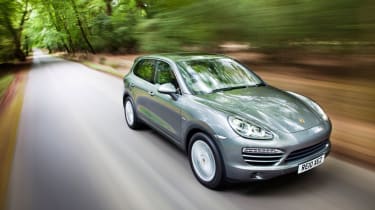Porsche Cayenne SUV (2011-2017) - MPG, running costs & CO2
Diesel Porsche Cayenne models are the sensible choice, as the petrol engines require seriously deep pockets
A car as large and fast as the Porsche Cayenne was never going to be a particularly economical model, and the petrol versions are predictably very expensive to run. The hybrid and diesel-engined versions are more reasonable, but it’s all relative; the Cayenne is never going to be exceptionally frugal unless you’re in a position to drive the hybrid model in electric mode most of the time.
At the end of the day, the Cayenne is a Porsche, which means the overall cost of ownership is going to be high. Insurance, servicing and parts aren’t cheap, but you do at least know that the car’s upmarket image and desirability mean it will hold on to more of its value than many rivals when you come to sell or trade it in.
Porsche Cayenne MPG & CO2
You’d be forgiven for thinking that the Porsche Cayenne costs a small fortune to keep running, but as long as you avoid the thirsty petrol engines, it's actually quite reasonable. In fact, the Porsche Cayenne S E-Hybrid returns a claimed 83.1mpg and emits just 75-79g/km of CO2, meaning it gets a low Benefit-in-Kind (BiK) rating of between 13 and 17%.
The S E-Hybrid can achieve these figures because its battery pack allows it to travel for up to 22 miles using only electric power, but it needs topping-up from a household electrical socket or a public EV charging point fairly regularly if you want to avoid using the petrol engine. If you drive the car on electric power alone for short journeys, you may never have to visit a petrol station again, but switch it into Sport mode to have some fun on twisty roads and that 83.1mpg figure will quickly plummet towards the 20mpg mark.
More reviews
Most UK buyers will choose the standard Cayenne Diesel or more powerful Cayenne Diesel S versions, which return 42.8mpg and 35.3mpg respectively, with corresponding CO2 emissions of 173g/km and 209g/km. For these engines, company car drivers will be liable for a BiK rate of 36 or 37%.
The petrol Cayenne S has a sports-car-like thirst for fuel, with figures of 29.7mpg and 223g/km, while the Cayenne Turbo is the true SUV alternative to a supercar and manages just 25.2mpg and emits 261g/km of CO2, placing it in the highest 37% BiK bracket.
The Porsche Cayenne GTS sits between the Cayenne S and the Cayenne Turbo in the petrol range – and falls between those two models for fuel economy too, returning 28.8mpg. The fastest model in the range, the Cayenne Turbo S, can only manage a claimed 24.6mpg, so fuel bills will be significant.
All Cayennes cost £140 a year to tax, except for the hybrid, which costs £130 a year. Due to a plus-£40,000 list price, however, an additional annual charge of £310 applies, running from years two to six of the car's life, increasing the total to £450 in that period (or £440 for the hybrid).
Insurance groups
A combination of the Cayenne’s performance and the image of a brand like Porsche make this an expensive car to insure. The basic petrol model is in group 44, while the entry-level diesel is in group 45. The S E-Hybrid model is in group 49 and almost every other version (Including the GTS and Turbo) sits in the top group 50.
Servicing
The Porsche Cayenne needs its first minor service after two years or 20,000 miles and a major service after four years or 40,000 miles. Prices vary slightly depending on which model you own, but you should budget around £420-£460 for a minor service and £500 for a major service.
Warranty
The Porsche Cayenne comes with a two-year warranty that covers the car for unlimited mileage during that time. After that, you can choose to extend the cover at extra cost. It works out at just over £1,000 a year to do so.













